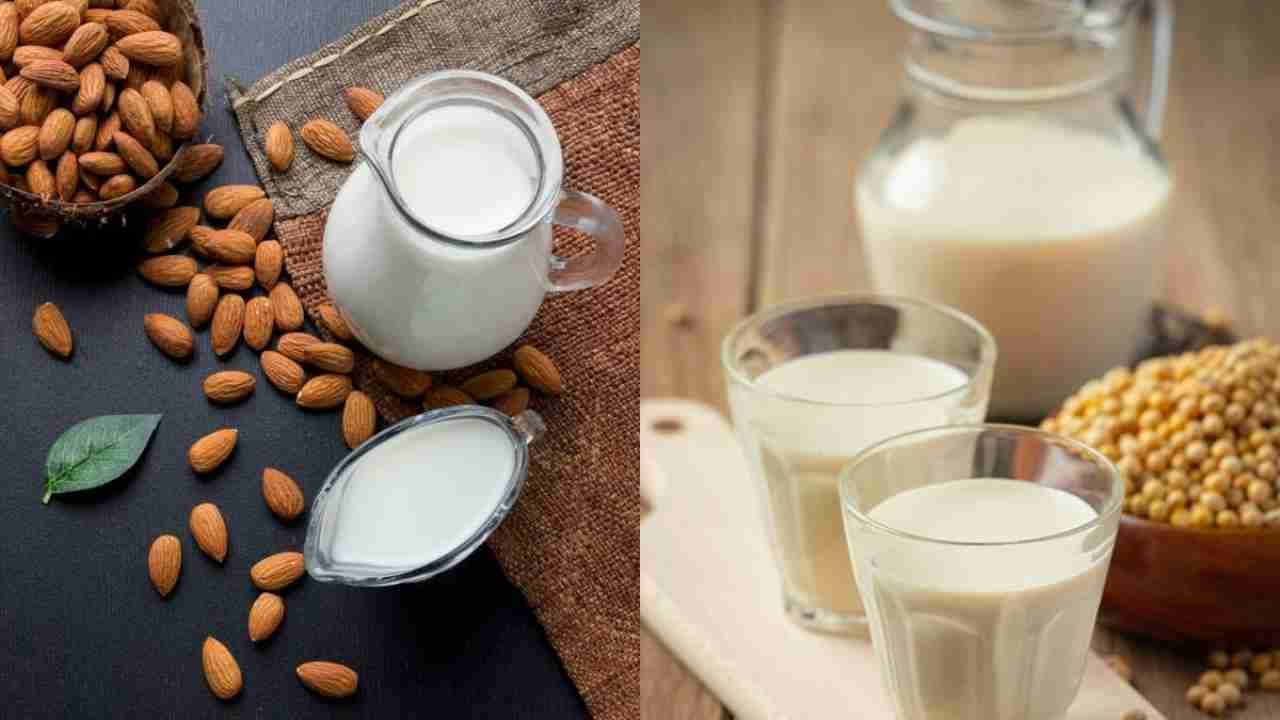In recent years, the popularity of plant-based milk alternatives has soared among health-conscious individuals. Among these alternatives, almond milk and soy milk stand out for their distinct flavors and nutritional profiles. But which one is truly the healthier choice? Let’s delve into the debate.

Nutritional Value:
Almond milk, crafted by blending almonds with water and straining out the pulp, emerges as a low-calorie option, packing only 30-50 calories per cup. With a mere 2.5 grams of fat per cup, it’s also a lean choice. Furthermore, almond milk boasts a noteworthy calcium content, offering about 45% of the recommended daily intake per cup.
On the flip side, soy milk, derived from soaked, ground soybeans, and boiled to produce a milky liquid, provides around 80-90 calories and 4 grams of fat per unsweetened cup. Comparable to cow’s milk, soy milk offers approximately 30% of the recommended daily calcium intake per cup.
Almond Milk: Almond milk, a product of blending almonds with water and straining out the pulp, stands out as a nutritional powerhouse with several remarkable attributes. Firstly, its low-calorie nature makes it an attractive option for those aiming to manage their calorie intake or achieve weight loss goals. With only 30-50 calories per cup, almond milk offers a guilt-free alternative to traditional dairy milk, allowing individuals to enjoy their favorite beverages without the added concern of excessive caloric intake.
Moreover, almond milk is inherently low in fat, containing a mere 2.5 grams of fat per cup. This makes it an excellent choice for individuals seeking to reduce their fat consumption or adhere to a low-fat diet regimen. By opting for almond milk over higher-fat alternatives, individuals can effectively minimize their saturated fat intake, thereby supporting heart health and reducing the risk of cardiovascular diseases.
One of the most notable nutritional aspects of almond milk is its impressive calcium content. Calcium plays a pivotal role in maintaining bone health, supporting muscle function, and promoting overall well-being. Almond milk typically provides around 45% of the recommended daily calcium intake per cup, making it a valuable source of this essential mineral. For individuals who are lactose intolerant or prefer plant-based alternatives, almond milk offers a convenient and nutritious way to meet their calcium needs without relying on dairy products.
Soy Milk: In contrast to almond milk, soy milk derives from soaked, ground soybeans that are subsequently boiled to produce a creamy liquid. Despite its higher calorie and fat content compared to almond milk, soy milk remains a popular choice among health-conscious consumers for its diverse array of nutrients and potential health benefits.
With approximately 80-90 calories per cup and 4 grams of fat, unsweetened soy milk provides a satisfyingly creamy texture while still offering a moderate caloric load. This makes it a suitable option for individuals seeking a more substantial beverage choice without compromising their dietary goals.
Similar to cow’s milk, soy milk boasts a commendable calcium content, delivering approximately 30% of the recommended daily calcium intake per cup. This makes soy milk a viable alternative for individuals looking to fortify their diet with calcium-rich foods and beverages, especially those who adhere to vegan or lactose-free diets.
Protein Content:
Protein, essential for building and repairing body tissues, varies significantly between these alternatives. Soy milk takes the protein crown, offering approximately 7-9 grams per cup, equivalent to cow’s milk. Conversely, almond milk pales in comparison, with only 1 gram of protein per cup.
Protein Content:
Protein serves as a fundamental building block for the body, crucial for the repair and growth of tissues, as well as the synthesis of enzymes, hormones, and other essential molecules. While both almond milk and soy milk offer valuable nutritional benefits, they differ significantly in their protein content, which plays a pivotal role in determining their suitability for various dietary needs.
Soy Milk:
Soy milk emerges as the undisputed champion in the realm of plant-based milk alternatives when it comes to protein content. With approximately 7-9 grams of protein per cup, soy milk rivals the protein density of cow’s milk, making it an excellent source of this vital nutrient for individuals seeking to meet their daily protein requirements.
The substantial protein content of soy milk can be attributed to its primary ingredient: soybeans. Soybeans are renowned for their high protein content, containing all the essential amino acids required by the human body. This makes soy milk a complete protein source, providing individuals with a comprehensive array of amino acids necessary for optimal health and wellness.
Furthermore, the protein in soy milk is readily digestible and bioavailable, ensuring efficient absorption and utilization by the body. This makes soy milk an ideal choice for athletes, fitness enthusiasts, and individuals with active lifestyles who require adequate protein intake to support muscle repair, recovery, and growth.
Almond Milk:
In contrast to soy milk, almond milk falls short in the protein department, offering a significantly lower protein content per cup. With only 1 gram of protein per cup, almond milk pales in comparison to soy milk and cow’s milk, making it a less potent source of this essential nutrient.
The minimal protein content of almond milk can be attributed to its primary ingredient: almonds. While almonds contain protein, the process of transforming them into almond milk involves diluting the almonds with water and straining out the pulp, resulting in a beverage with reduced protein density.
Despite its lower protein content, almond milk still offers valuable nutritional benefits, such as being low in calories and fat, making it a suitable option for individuals seeking a lighter alternative to dairy milk or those looking to manage their weight.
Vitamins and Minerals:
Both almond milk and soy milk are fortified with essential vitamins and minerals. Almond milk is typically enriched with vitamin D, aiding calcium absorption and promoting bone health. It also boasts vitamin E, a potent antioxidant shielding cells from free radical damage. Soy milk, on the other hand, is fortified with vitamins A, B2, B12, and D, along with potassium, magnesium, and iron.
Vitamins and minerals are essential micronutrients that play diverse roles in maintaining overall health and well-being. Both almond milk and soy milk are fortified with a range of these nutrients, enhancing their nutritional value and contributing to a balanced diet. Let’s delve deeper into the specific vitamins and minerals found in each of these plant-based milk alternatives:
Almond Milk:
Almond milk is commonly fortified with several essential vitamins and minerals to bolster its nutritional profile. One of the key nutrients added to almond milk is vitamin D, a fat-soluble vitamin crucial for calcium absorption and bone health. By fortifying almond milk with vitamin D, manufacturers aim to provide consumers with a dairy-free alternative that supports skeletal strength and helps prevent conditions like osteoporosis.
Additionally, almond milk is enriched with vitamin E, a powerful antioxidant renowned for its ability to protect cells from oxidative damage caused by free radicals. Vitamin E plays a vital role in maintaining skin health, supporting immune function, and promoting overall vitality. By incorporating vitamin E-fortified almond milk into their diet, individuals can benefit from its antioxidant properties and contribute to their overall wellness.
Soy Milk:
Similar to almond milk, soy milk undergoes fortification with essential vitamins and minerals to enhance its nutritional content. Soy milk is typically enriched with a variety of vitamins, including vitamin A, which supports vision, immune function, and skin health. Vitamin A-fortified soy milk provides consumers with an easy way to meet their daily vitamin A requirements without relying solely on animal-derived sources.
Moreover, soy milk is fortified with vitamin B2 (riboflavin) and vitamin B12 (cyanocobalamin), both of which play crucial roles in energy metabolism, nerve function, and red blood cell production. These B vitamins are particularly important for vegetarians and vegans, as they are commonly found in animal products. By fortifying soy milk with vitamin B2 and B12, manufacturers ensure that individuals following plant-based diets have access to these essential nutrients.
In addition to vitamins, soy milk is fortified with minerals such as potassium, magnesium, and iron. Potassium is vital for maintaining electrolyte balance, muscle function, and blood pressure regulation, while magnesium supports bone health, muscle function, and nerve transmission. Iron is essential for oxygen transport in the blood and plays a key role in preventing iron-deficiency anemia.
Potential Health Benefits:
Almond milk is celebrated for its potential heart health perks, attributed to its high vitamin E content, which can help reduce cholesterol levels and enhance blood flow. Additionally, its low calorie and fat content make it a favorable option for weight management.
Soy milk, however, shines with its protein and nutrient-rich composition. Its isoflavones have been linked to decreased cholesterol levels and reduced heart disease risk. Moreover, soy milk’s phytoestrogens may alleviate menopausal symptoms like hot flashes and night sweats.
Almond Milk:
Almond milk has garnered attention for its potential cardiovascular benefits, largely due to its high content of vitamin E, an antioxidant renowned for its role in reducing oxidative stress and inflammation in the body. Vitamin E has been associated with improvements in heart health by helping to lower LDL (bad) cholesterol levels and promoting healthy blood flow, which may reduce the risk of heart disease and related complications.
Additionally, almond milk’s low calorie and fat content make it an appealing option for individuals looking to manage their weight or reduce calorie intake. By substituting higher-calorie and higher-fat beverages with almond milk, individuals can potentially decrease their overall energy intake while still enjoying a satisfying and nutritious drink.
Soy Milk:
Soy milk boasts an impressive array of health benefits, primarily attributed to its protein-rich composition and the presence of bioactive compounds such as isoflavones and phytoestrogens. Isoflavones, in particular, have been extensively studied for their potential role in reducing cholesterol levels and mitigating the risk of cardiovascular disease. These plant compounds have been shown to interfere with cholesterol absorption, leading to lower LDL cholesterol levels and a more favorable lipid profile.
Moreover, soy milk’s phytoestrogens, which mimic the action of estrogen in the body, have been associated with various health benefits, particularly for women experiencing menopause. Phytoestrogens may help alleviate symptoms such as hot flashes and night sweats, providing relief and improving overall quality of life during this transitional period.
Furthermore, soy milk’s protein content makes it an excellent choice for individuals seeking to increase their protein intake, particularly those following vegetarian or vegan diets. Adequate protein intake is essential for muscle maintenance, repair, and growth, as well as for supporting overall metabolic health.
Which is the Healthier Option?
The verdict on almond vs soy milk’s healthiness hinges on individual needs and preferences. If you prioritize a low-calorie, low-fat alternative, or grapple with lactose intolerance, almond milk may be your top pick. Conversely, if you seek a protein-rich option or are concerned about cholesterol, soy milk emerges as the winner.
The debate over whether almond milk or soy milk is the healthier option ultimately depends on individual dietary preferences, nutritional needs, and health goals. Let’s delve deeper into the factors influencing this decision:
Almond Milk:
Almond milk presents itself as a compelling option for individuals seeking a low-calorie, low-fat alternative to traditional dairy milk. With its minimal caloric content and low fat content, almond milk is well-suited for those looking to manage their weight or reduce calorie intake without sacrificing taste or nutrition. Additionally, almond milk is naturally lactose-free, making it an excellent choice for individuals with lactose intolerance or dairy allergies.
Moreover, almond milk boasts a noteworthy calcium content, which is essential for maintaining bone health and preventing conditions like osteoporosis. By fortifying almond milk with vitamin D, manufacturers further enhance its calcium absorption and bone-promoting properties, making it a valuable addition to a balanced diet.
However, almond milk falls short in terms of protein content compared to soy milk, containing only 1 gram of protein per cup. While this may not be a concern for individuals with lower protein requirements, such as those following a sedentary lifestyle, athletes or individuals seeking to increase their protein intake may find almond milk less satisfying in this regard.
Soy Milk:
Soy milk emerges as a frontrunner for individuals prioritizing protein-rich options or seeking to address concerns related to cholesterol levels and heart health. With its substantial protein content, comparable to cow’s milk, soy milk provides a valuable source of this essential nutrient, supporting muscle maintenance, repair, and growth.
Furthermore, soy milk’s bioactive compounds, such as isoflavones and phytoestrogens, have been linked to various health benefits, including reduced cholesterol levels, improved cardiovascular health, and relief from menopausal symptoms. For individuals concerned about cholesterol levels or experiencing hot flashes and night sweats, soy milk may offer significant relief and support for overall well-being.
Conclusion
In conclusion, both almond milk and soy milk stand out as valuable additions to a healthy diet, each offering unique nutritional benefits to cater to diverse dietary preferences and individual health goals. Let’s further explore the significance of this conclusion:
Nutritional Benefits:
Both almond milk and soy milk provide a range of essential nutrients, including vitamins, minerals, and phytonutrients, that contribute to overall health and well-being. Almond milk offers a low-calorie, low-fat option enriched with vitamin E and calcium, ideal for individuals seeking a lighter alternative to traditional dairy milk or managing weight.
On the other hand, soy milk shines with its protein-rich composition, fortified with vitamins A, B2, B12, and D, along with minerals like potassium, magnesium, and iron. Soy milk’s bioactive compounds, such as isoflavones and phytoestrogens, offer potential benefits for heart health, cholesterol management, and alleviating menopausal symptoms.
Personal Health Goals:
When deciding between almond milk and soy milk, it’s essential to consider your individual health goals and dietary requirements. If you prioritize weight management, lactose intolerance, or prefer a low-calorie option, almond milk may be the preferred choice for you. Its light texture and mild flavor make it versatile for use in various recipes and beverages.
Conversely, if you’re seeking a protein-rich alternative, concerned about cholesterol levels, or experiencing menopausal symptoms, soy milk may better suit your needs. Its robust nutritional profile and potential health benefits make it a valuable addition to a balanced diet, particularly for individuals with higher protein requirements or specific health concerns.
Personal Preferences:
Beyond nutritional considerations, personal preferences also play a crucial role in determining the preferred choice between almond milk and soy milk. Taste preferences, texture preferences, and dietary restrictions can influence your decision and ultimately impact your satisfaction with the chosen plant-based milk alternative.
Top 20 FAQs about Almond vs Soy Milk: Which is a Healthier Option?
- Q: Is almond milk or soy milk better for weight loss?
- A: Almond milk is lower in calories and fat compared to soy milk, making it a preferred option for those aiming for weight loss.
- Q: Which milk has more protein: almond or soy?
- A: Soy milk contains more protein than almond milk, making it a better choice for individuals looking to increase their protein intake.
- Q: Can almond milk replace soy milk in recipes?
- A: Yes, almond milk can generally be used as a substitute for soy milk in recipes, but it may result in a slightly different flavor and texture.
- Q: Are almond milk and soy milk both suitable for lactose intolerance?
- A: Yes, both almond milk and soy milk are lactose-free alternatives suitable for individuals with lactose intolerance.
- Q: Which milk is better for bone health: almond or soy?
- A: Both almond milk and soy milk are fortified with calcium and vitamin D, making them beneficial for bone health.
- Q: Is soy milk better for heart health than almond milk?
- A: Soy milk may offer additional heart health benefits due to its protein content and isoflavones, which have been linked to cholesterol reduction.
- Q: Can almond milk be consumed by individuals with nut allergies?
- A: Individuals with nut allergies should avoid almond milk and opt for soy milk or other non-nut-based milk alternatives.
- Q: Does almond milk or soy milk have more vitamins?
- A: Both almond milk and soy milk are fortified with essential vitamins, but their specific vitamin content may vary depending on the brand and fortification process.
- Q: Which milk is better for infants: almond or soy?
- A: Neither almond milk nor soy milk is suitable as a primary source of nutrition for infants. Consult with a pediatrician for appropriate infant feeding options.
- Q: Can almond milk or soy milk be used as a substitute for breast milk or formula?
- A: Neither almond milk nor soy milk is a suitable replacement for breast milk or infant formula, which provide essential nutrients for infants’ growth and development.
- Q: Are there any allergen concerns with almond milk or soy milk?
- A: Almond milk may pose allergen concerns for individuals with nut allergies, while soy milk may trigger soy allergies in susceptible individuals.
- Q: Which milk is better for individuals with diabetes: almond or soy?
- A: Both almond milk and soy milk can be suitable options for individuals with diabetes, but it’s essential to choose unsweetened varieties to manage blood sugar levels effectively.
- Q: Is almond milk or soy milk better for skin health?
- A: Almond milk’s vitamin E content may offer benefits for skin health, but soy milk’s protein and isoflavone content may also contribute to overall skin health.
- Q: Does almond milk or soy milk contain more antioxidants?
- A: Almond milk contains vitamin E, a potent antioxidant, while soy milk’s isoflavones also possess antioxidant properties.
- Q: Can almond milk or soy milk help with lactose intolerance symptoms?
- A: Yes, both almond milk and soy milk are suitable alternatives for individuals with lactose intolerance, as they are lactose-free.
- Q: Which milk is better for building muscle: almond or soy?
- A: Soy milk’s higher protein content makes it a better option for individuals looking to support muscle growth and recovery.
- Q: Are there any hormonal concerns with consuming soy milk?
- A: Soy milk contains phytoestrogens, which may have minor hormonal effects, but current research suggests that moderate consumption is safe for most individuals.
- Q: Can almond milk or soy milk help with menopausal symptoms?
- A: Soy milk’s phytoestrogens may help alleviate menopausal symptoms such as hot flashes and night sweats.
- Q: Which milk is better for individuals with high cholesterol: almond or soy?
- A: Soy milk may be more beneficial for individuals with high cholesterol due to its isoflavones, which have been linked to cholesterol reduction.
- Q: Can almond milk or soy milk be used as a milk replacement in coffee?
- A: Yes, both almond milk and soy milk can be used as dairy alternatives in coffee, providing a creamy texture and distinct flavor profile.
Register for My Upcoming Masterclass HERE
See You in the Live Masterclass
Sunil Chaudhary stands as a preeminent global Leading digital coach, boasting a diverse clientele hailing from over 50 nations. Renowned for his prowess as an exemplary SEO expert, business automation coach, and landing page authority, Chaudhary also holds the distinction of being esteemed as the finest business coach in India. Beyond technical domains, he imparts invaluable insights into mindset, success, and life skills, thus encompassing a holistic approach to mentorship.
Join FREE Courses HERE
Know The Author:
 Sunil Chaudhary aka Suniltams Guruji is India’s Leading Digital Coach. He provides complete Digital Skill Development Coaching with great support. Sunil has trained more than 25000 students and helped more than 1100 businesses so far. Sunil is a well-known face across the world for Digital Coaching.
Sunil Chaudhary aka Suniltams Guruji is India’s Leading Digital Coach. He provides complete Digital Skill Development Coaching with great support. Sunil has trained more than 25000 students and helped more than 1100 businesses so far. Sunil is a well-known face across the world for Digital Coaching.
Digital Success Coach | Best SEO Coach India | Mindset Coach | Life Success Coach
Related posts:
 The Milky Way: Exploring the Wonders of Milk
The Milky Way: Exploring the Wonders of Milk
 Embracing Life’s Sweetness and Bitterness: Exploring the Metaphor of Milk and Honey
Embracing Life’s Sweetness and Bitterness: Exploring the Metaphor of Milk and Honey
 Superfood Pigweed: Unveiling the 5 Incredible Benefits of Amaranth
Superfood Pigweed: Unveiling the 5 Incredible Benefits of Amaranth
 Superfood Tofu: Unveiling the Top 5 Benefits of Bean Curd
Superfood Tofu: Unveiling the Top 5 Benefits of Bean Curd
 The Ultimate Guide to Milk Powder: Everything You Need to Know
The Ultimate Guide to Milk Powder: Everything You Need to Know
 Cucumber vs. Zucchini: Which is Healthier?
Cucumber vs. Zucchini: Which is Healthier?
 Ramadan 2024: 5 Essential Self-Care Practices to Enhance Your Well-being
Ramadan 2024: 5 Essential Self-Care Practices to Enhance Your Well-being
 Superfood Fava Beans: Know these 5 Benefits of Baakala
Superfood Fava Beans: Know these 5 Benefits of Baakala
 Skim Milk vs. Whole Milk: Which is Healthier?
Skim Milk vs. Whole Milk: Which is Healthier?

